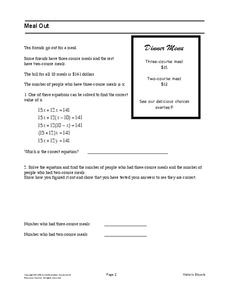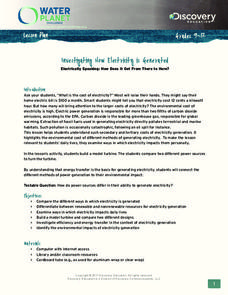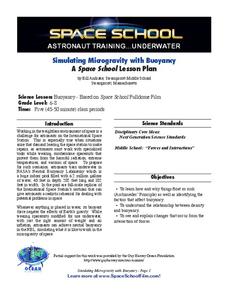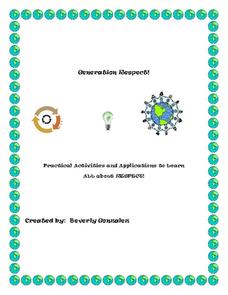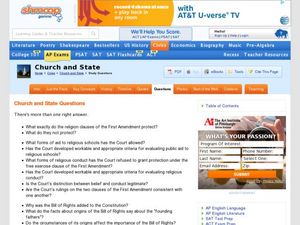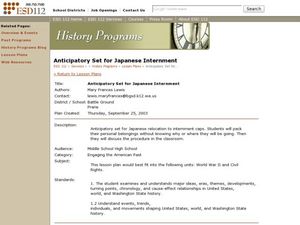Visa
Credit Cards
Choosing your first credit card can often be an intimidating and confusing experience for young adults. Give your pupils the foundational knowledge they need for tackling this process head-on, including learning to distinguish different...
K12 Reader
The Ransom of Red Chief
Readers identify the irony in the ransom note to Ebenezer Dorset and his reply as part of a reading comprehension activity using O. Henry's "The Ransom of Red Chief."
Practical Money Skills
Making Decisions
A set of quizzes and assessments would make a great companion to your lesson on making decisions and opportunity risks. Learners watch a PowerPoint before answering multiple choice questions about interest rates, saving money, and the...
K5 Learning
A Restaurant
What can you eat at a restaurant? And how will you get it from your table? Learn about restaurant-specific words with a reading comprehension lesson about the people who work in restaurants, as well as the types of foods that various...
Consumers Energy
The Cost of Electricity
How much is your toaster costing you every day? Young environmentalists calculate the monetary costs of household appliances based on their average consumption of wattage.
Mathematics Assessment Project
Meal Out
Middle schoolers identify an equation in one variable that models a restaurant order. They then solve the equation to determine the number of people who had each type of meal.
EarthEcho International
Investigating How Electricity is Generated
What is the real cost of electricity? The real cost is not just the price you pay, but the environmental and economic costs as well. Scholars build, use, and judge the effectiveness of a turbine. They also investigate the environmental...
Read Works
First Thanksgiving Meal
Cranberries, oysters, lobster, deer, and cabbage were just a few of the foods found on the table at the First Thanksgiving. After reading a two-page passage about the historic meal, class members respond to 10 reading response questions.
Florida International University
Simulating Microgravity with Buoyancy
How do astronauts know how to live and work in a weightless environment? It doesn't come naturally! Junior physicists conduct experiments to examine the link between buoyancy and microgravity. Each activity illustrates a different aspect...
Library of Virginia
An Overview of American Slavery
The final lesson in a unit study of American slavery asks young historians to synthesize what they have learned about how slavery in America changed over time. Revisiting the many documents they have examined, they consider the economic,...
PBS
African American History: Climbing the Wall
Imagine the challenge of trying to trace your family genealogy if no records were kept of births and deaths. Where would you look for information? What types of documents could provide you with the information you seek? History...
K12 Reader
Little Women: Helping Father
Jo's decision to sell her hair to bringing her wounded father home is a pivotal and poignant scene from Louisa May Alcott's Little Women. Class members read the excerpt and answer four questions about the details, vocabulary, and plot...
Spreading Gratitude Rocks
Generation of Respect
R.E.S.P.E.C.T. Learners find out what it means to them. Scholars write sentences, do a word sort, and list what makes them grateful. Additionally, pupils learn how to be more respectful by completing worksheets that would make Aretha...
Reading Through History
The Fugitive Slave Act of 1850
Why was the Fugitive Slave Act of 1850 so important? The reading in the resource discusses how the act affected Southerners, Northerners, and the slaves themselves. Scholars complete the reading as a form of direct instruction while...
Curated OER
Creating a Classroom Belief Statement
Fourth graders cooperatively develop a classroom belief statement that serves as their classroom constitution. Each student is involved in the creation of the statement. Each group presents their belief statement to the class.
Curated OER
Politics (1)
In this online interactive world history worksheet, students answer 26 matching questions regarding politics. Students may submit their answers to be scored.
Alabama Learning Exchange
Read All About It! Supreme Court Case Makes Headlines!
Students are assigned a landmark Supreme Court case to research. They construct a one-page newsletter on the case which include a summary of the case, two pictures and a short biography on one of the justices on the Court at that time.
Curated OER
Church and State Questions
In this U. S. government worksheet, learners respond to 17 short answer questions about the first amendment and the separation of church and state.
Curated OER
U.S. Constitution
Students examine the U.S. Constitution. In this American government lesson, students explore the purpose and significance of the Constitution as they read the provided handouts and complete the provided worksheet.
Curated OER
social Studies: First Amendment Role-Play
Students evaluate First Amendment case decisions by the Supreme Court. they divide into three groups - Supreme Court justices, prosecution attorneys, and defense lawyers. Both sides present their arguments and the justices deliver...
Curated OER
Celebrate Constitution Day
Students examine the constitutions structure, content, and underlying philosophy by skimming through as a class then breaking into groups to focus on separate articles. To reinforce learning they individually analyze constitutional...
Curated OER
Anticipatory Set for Japanese Internment
Students simulate Japanese relocation to internment camps after the bombing of Pearl Harbor. They select items to pack that are personally, sentimentally, and financially important to them. They create a Venn diagram comparing and...
Curated OER
Researching American Democracy
Students compare Watergate and the Clinton/Lewinsky scandal. In this U.S. Constitution lesson, students define vocabulary terms and read articles regarding the impeachment process. Students respond to questions that require them to...
Alabama Learning Exchange
Learning About Colonial Life
High schoolers use predictions to explore the lifestyle of American colonists. They draw conclusions about the culture of colonial America based on items used in daily life.







